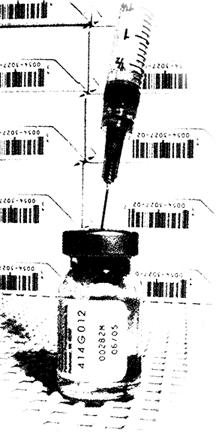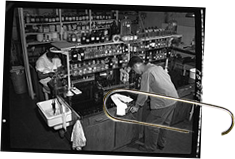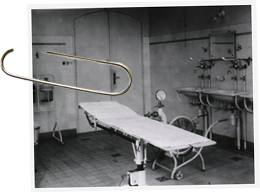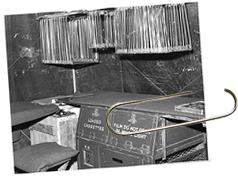

|
CHART #
00830100000 |
PRIMARY FACILITY
Vestibriüm University Hospital |
CODE
|
ATTENDING PHYSICIAN
Kördann (Kördann) |
TYPE
W |
AU
7 |
|
DISPOSITION (STATUS)
In progress |
ARTICLE (JOURNAL REF)
Jar of Ether, Unattended |
||||


Friday, 9:49 a.m.
Molecular Biological Research Lab, SB17.

...at least two stories underground, at the end of a narrow (and nearly forgotten) hallway lined with archaic machinery repudiated by other departments, a small cavern perpetually tinged with the unmistakable redolence of hydrochloric acid. The floor (and ceiling) discolored with curious blotches. Stainless steel benches crowded with stacks of petri dishes and disposable pipettes; tangled wires and tubing rampant amid bottles of solvents. Elaborate contrivances of glass and rubber...
And, barely perceptible over the gentle whir of electric centrifuges and chemical hood fans, the haunting organ of Albinoni's Adagio for Strings.
Dr. Kördann sighed, and pushed a lock of auburn hair behind her ear. "I was on fourth floor," she admitted. (Where the patients are.) "That girl..." she said, "Died." (Finally.) I returned a small glass tube to its slot in the rack -- no visible precipitate. "That's good." I closed the incubator. "Yeah." Dr. Kördann tugged at her lab jacket and folded her arms, as if cold. "But it's been raining all week," she continued, "I was hoping it might let up for a day, you know?" I nodded, "Yeah."

She glanced at the board, upon which the previous day's sketches of complex molecules had been overlain with an aggregate of chemical equations. She frowned and shook her head. "Are you okay?" I inquired (well aware of the answer). "No." She turned her attention to the crude apparatus partially assembled on the bench (a practical manifestation of the board's conjecture), and shook her head again. "We're missing something," she mumbled softly, "It's here -- in this room -- but I can't see it. And that girl..."
Her shoulders visibly trembled, as if shivering -- in a laboratory that wasn't at all cold, but which embodied (to her) an inimical entity. Tauntingly elusive. Rapidly enveloping her with a very mortal frustration. "Coffee," I decided, "Upstairs."
Where we surveyed the cafeteria. A curious assembly of staff (green scrubs) and visitors huddled over tables... All expressing veiled predictions.
"Not here," Dr. Kördann implored.
So, we stopped at an espresso cart in the lobby, then proceeded to wander a random corridor in the original wing (an administrative area -- marginally removed from the public thoroughfare), pausing on occasion for her to read those bronze plaques honoring the hospital's founding surgeons. Eulogized for practicing their vocation with little more than a sharp knife, spools of catgut, and a jar of ether. "Visionary." We walked a bit more.
Then she nodded...
Empty. Dr. Kördann slumped onto one of the hard benches, and I sat beside her in the dim light. Silence, as she unexpectedly leaned her shoulder against mine.
"I'm a 'medical' doctor," she remarked softly, "But this is precisely why I don't work with patients, you know?" She rubbed her eyes -- adjusted her glasses. "That girl..." I put my arm around her shoulder, feeling her tremble slightly beneath the lab coat. "Faith of desperation?" I speculated, "Last hope, even when there's none." Dr. Kördann leaned forward slowly, elbows on her knees. "There's always hope," she insisted quietly, staring at the floor. "Even after they die, there's hope. And most of them know that. Somehow, they feel it in those final hours. After that... Well, it's only a matter of time." And she paused (for a nearly a minute).

"But that's not what I meant," she resumed, "I don't work with patients because of the survivors, you know? Which is what I am now, forcing you into the role I've sedulously avoided." I tightened my arm, pulling her closer, as she nudged her face into my shoulder. And I felt the dampness of her tears. "Down in the labs," I reflected, "we're all survivors. Most of us just never go upstairs..." (where the patients are). Dr. Kördann shook her head, "No," she corrected hoarsely. "Surviving requires that we remain alive. And without fourth floor, we're just hiding down in that bunker, behind stacks of petri dishes and disposable pipettes..." Elaborate contrivances of glass and rubber. "...or, worse yet, a board of chemical equations."
Unsubstantiated theory...
11:57 a.m.
And again, "Are you okay?"
She folded her arms, as if cold. "It's been raining all week," she reflected, "I was hoping it might let up for a day, you know?" I nodded... And she turned her attention to the crude apparatus partially assembled on the bench (a practical manifestation of the board's conjecture). "It's here," she mumbled softly, "In this room." (Taunting.) "Those bronze plaques," she ruminated abruptly, "Upstairs. You ever read them?" I frowned, "No." Dr. Kördann pursed her lips, staring blankly at the tangled wires and tubing. The glass and the rubber... "I do," she admitted. "At night, when no one is here, I go upstairs..."